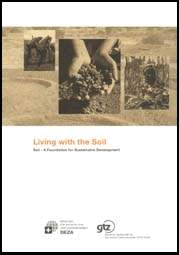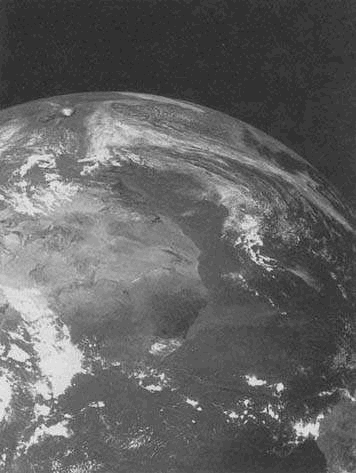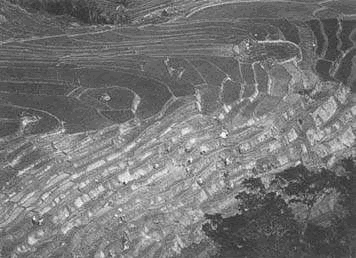
The "Brown Planet"[edit | edit source]
Viewed from these lofty heights, phrases like Â"down to earthÂ" take on a new, global meaning. Because although it has often gone unnoticed, around the world soil is increasingly coming to be seen as a key resource which must be better utilised and conserved. As the worldÂ's population continues to grow, global food security and economic viability will depend on the sustainable management of that resource.
The satellite perspective shows up the relative dimensions of the oceans, continents and geographical features. It makes visible the fact that the earthÂ's land masses cover only one-quarter of its surface, and that only 10% of the total area can be utilised for agriculture. The view from space has also taught us to see the earth as a single ecological system of astonishing and incredibly complexity. As the substrate of all terrestrial life, soil plays a special role within this system. It nourishes plants and animals, and forms the solid ground on which crop cultivation, livestock farming and forest management take place. It is the basis for survival of billions of people.
This vitally important resource, soil, covers the earthÂ's land masses like only a thin skin. Just as a human beingÂ's skin is thin and sensitive, but at the same is a vitally important organ, the earthÂ's skin is also sensitive, yet vitally important for the survival of humans, plants and animals.
Modern civilisation, however, barely ever notices the soil with the human senses. We build houses and roads on it, and cover it with asphalt, gravel and railway lines. At most, we notice it as dirt on our hands to be washed off immediately.
A more contemporary perspective shows soil to be a resource of strategic significance that merits our full attention. It is already clear today that soil is becoming scarce; scarce, because we are becoming more numerous. Scarce too, because degradation, and poor management producing low yields, do not generate sufficient food security. Yet processes like erosion and soil impoverishment are not a natural inevitability. They can be influenced through coordinated measures, taken within the scope of development projects.
German and Swiss development cooperation have been addressing the theme of sustainable rural development, including the issue of more productive but sustainable soil management, over a period of years. In so doing it has acquired a wealth of experience. Promising techniques and strategies are available. This magazine presents those experiences, with the aim of making them available to development cooperation on a more focused and fruitful basis.


